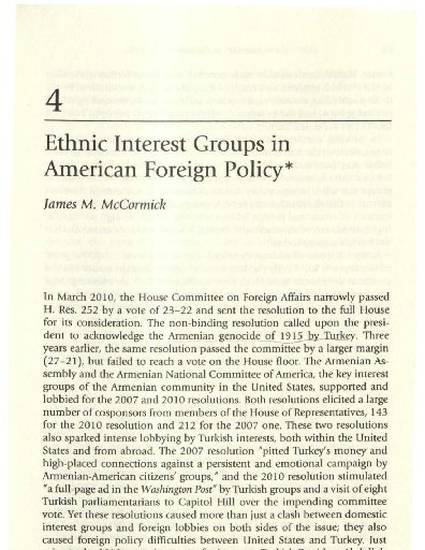
In March 2010, the House Committee on Foreign Affairs narrowly passed H. Res. 252 by a vote of 23-22 and sent the resolution to the full House for its consideration. The non-binding resolution called upon the president to acknowledge the Armenian genocide of 1915 by_ Turkey. Three years earlier, the same resolution passed the committee by a larger margin (27-21), but failed to reach a vote on the House floor. The Armenian Assembly and the Armenian National Committee of America, the key interest groups of the Armenian community in the United States, supported and lobbied for the 2007 and 2010 resolutions. Both resolutions elicited a large number of cosponsors from members of the House of Representatives, 143 for the 2010 resolution and 212 for the 2007 one. These two resolutions also sparked intense lobbying by Turkish interests, both within the United States and from abroad. The 2007 resolution Hpitted Turkey's money and high-placed connections against a persistent and emotional campaign by Armenian-American citizens' groups, w and the 2010 resolution stimulated Ha full-page ad in the Washington Post" by Turkish groups and a visit of eight Turkish parliamentarians to Capitol Hill over the impending committee vote. Yet these resolutions caused more than just a dash between domestic interest groups and foreign lobbies on both sides of the issue; they also caused foreign policy difficulties between United States and Thrkey. Just prior to the 2010 committee vote, for instance, Turkish President Abdullah Gul called President Obama apparently to seek his help in stopping this resolution, and Turkey subsequently recalled its ambassador to the United States in protest when the resolution passed in the Foreign Affairs Committee. Turkish interests also made veiled threats about further disruption in U.S.-Turkish relations as a result of the passage of this resolution. In all, these nonbinding resolutions, advocated and opposed by competing ethnic interest groups, had the potential of disrupting foreign relations between the United States and Turkey.
Available at: http://works.bepress.com/james-mccormick/3/

“Ethnic Interest Groups in American Foreign Policy,” in James M. McCormick, ed., The Domestic Sources of American Foreign Policy: Insights and Evidence. Sixth Edition. (Lanham, MD: Rowman & Littlefield Publishers, Inc., 2012), pp. 67-87 reproduced by permission of Rowman & Littlefield.